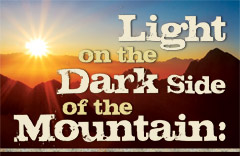Some would suggest I not put that in the past tense and would assert that now is the worst time, with growing cultural opposition to faith in the USA and the persecution of believers worldwide. Others might suggest the late first century with the persecution of Domitian or a little earlier with the Neronian persecution that claimed the lives of Paul and Peter. Others could point to the times when Jerusalem was under siege and people resorted to unspeakable acts to stave off starvation and oppose their enemies. Others would suggest the time of exile when God's people were hauled off to foreign lands and made slaves. Some might say the time of bondage in Egypt. You may have another idea or two.
For me, the period of time written about in the book of Judges is about as dark and bad as any. The people were stuck in a vicious cycle of destructive rebellion and disunity (Judges 2:8-19):
- They did evil in the sight of God.
- The LORD handed them over to their enemies.
- Their enemies oppressed them in horrible ways.
- The people turned their hearts to God and cried out to him for help.
- God raised up leaders (we sometimes call them Judges) to deliver them.
- The "Judge" died and the cycle repeated, growing worse each cycle.
However, at least one light shines brightly during this dismissal period. That light is named Deborah. Deborah is a prophet, wife, leader, and judge (Judges 4:1-8). But here's the problem: it wasn't enough. Deborah had to be co-general with Barak. Deborah tells Barak that God wants him to overthrow the vile rule of King Jabin and his general, Sisera. He and his men had oppressed God's people in unspeakable ways, they were an overpowering military force, and they committed vile acts against women and children in their conquests (Judges 4:1-3; 5:30).
Bottom line, Barak was afraid. He would not go unless Deborah accompanied him. So Deborah agreed, but warned Barak that the glory of his great victory would go to a woman. Sure enough, God delivered Sisera's army into Barak's hands. And just as promised, a woman named Jael kills Sisera and gains the glory for her courageous act, not Barak (Judges 4:9-23). God's people are delivered, Deborah is deeply admired, and Jael gains glory for her courageous act.
So what's the point?
God's people have often found themselves on the dark side of the mountain, without much hope, and with no one to light their way. Yet our ongoing story is full of women who step forward with courage, at great risk, and brought light to God's people when they were on the dark side of the mountain. Think about the unique role that women like Miriam, Huldah, Esther, Jehosheba, the women at the Cross, Martha, Mary, Dorcas, Pheobe, Chloe, Lydia, and Priscilla have played in God's story. The women stepped forward and did what men would not or could not do.
So let's follow their example as we are convicted by their courage and faith (Hebrews 13:7).
And as we think about the core message of the story of Deborah, let's keep in mind two things.
- Rather than fighting among ourselves about what women can and cannot do in the church today, let's go back and look at what women have done throughout the history of God's people in both the Old and New Testament. Let's read the often fought over passages about the role of women through the lens of what God had them do rather than interpret these verses in isolation from the witness of Scripture. Let's value women of faith in the way God's Word does.
- Let's realize that the story of Deborah is an in your face challenge for God's people to demand that men of courage, vision, risk-taking, and faith step forward. The charge is often made that all our churches want are "nice" men - men who are polite, don't take risks, don't make people nervous, and get along with folks. While we want men of holy character, we need to remember that the word "nice" is not used in Scripture to describe holy character. Let's remember that the memorable men of Scripture were a bit edgy, took bold risks, boldly stepped out in faith, and were men of courage.
There is too much talk today that is couched in fear - political fear, economic fear, fear of the future. The challenges we face are nothing compared to the oppression that God's people have faced in other times and in other places. Let's call our young men and young women to be people of faith and courage with deep trust in the LORD! Let's challenge them to risk their lives for the cause of Jesus and the Kingdom of God. Let's call them to move beyond being nice and challenge them to be bold and faithful in the face of opposition. When we do, I believe God will bring light to the dark side of our mountain and use men and women of courage, vision, and risk-taking faith to lead us to a new era in the victorious Kingdom of God.







Comments
Have thoughts on this article? Leave a comment